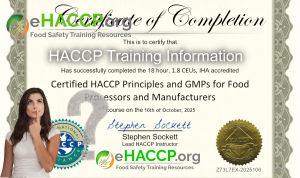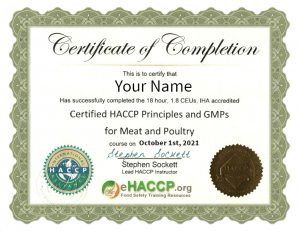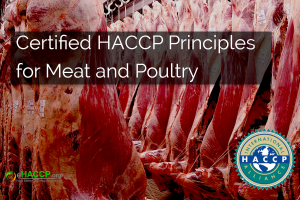Information About IHA Accredited HACCP Training and Certification
The most asked questions about HACCP training and appropriate answers
The course was very thorough and met my work's need for a compliance manager.”
RHODES CORNER, NS, CANADA, October 16, 2025 /EINPresswire.com/ -- eHACCP.org is a HACCP training and certification platform. Established in 2007 eHACCP.org has been providing HACCP and other food safety training to individuals and companies around the world.— Raymond von Flüe
As a HACCP training resource, we get asked many questions from people that call our toll-free number looking for answers. Here are some of the most asked questions.
What is HACCP?
HACCP, or Hazard Analysis and Critical Control Points, is a systematic, science-based approach to food safety that identifies, evaluates, and controls hazards throughout the food production process. It focuses on preventing biological, chemical, and physical hazards that could make food unsafe, rather than relying solely on end-product testing.
Developed initially for NASA’s space program in the 1960s, HACCP is now globally recognized and mandated in many countries (e.g., by the USDA for meat/poultry and FDA for certain foods in the U.S.). It’s used across food industries like meat, seafood, dairy, and produce to ensure safe food production, processing, and handling, often in conjunction with prerequisite programs like Good Manufacturing Practices (GMPs). The International HACCP Alliance (IHA) standardizes its application through training and accreditation.
How long does it take to become HACCP certified?
From an individual’s perspective, a person getting training in HACCP to become a HACCP practitioner, it can be done in as little as 18 hours by taking it online using an automated service like ehaccp.org. Or one can sign up for classroom training on a particular day. That training will take two consecutive days.
As a business, it can be done in as little as one day by companies that provide 3rd party auditing a certification services like NSF-GFTC, NSF, SAI-Global, Randolph & Associates, SGS, Siliker, and provided the documentation is representative of the reality within the facility and that both meet with the minimum requirements set out by the regulatory body such as the USDA, FDA or industry standards under the GFSI. The reality is that it can sometimes take weeks, months and in some rare instances, years.
When does the HACCP certificate expire?
A HACCP training certificate does not have an expiration date. Rather, the “retraining” should be done according to your auditor, client, industry requirements.
What authority body accredits HACCP training?
The best known and most ethical HACCP authority body is the International HACCP Alliance. The International HACCP Alliance is a non-profit organization focused on promoting and standardizing Hazard Analysis and Critical Control Points (HACCP) systems for food safety. Established in 1994 and based at Texas A&M University, it provides training, accreditation, and resources to support the development and implementation of HACCP plans across the food industry.
HACCP is a systematic approach to identifying, evaluating, and controlling food safety hazards, widely used globally to ensure safe food production, processing, and handling. The Alliance collaborates with industry, academia, and regulatory bodies to offer standardized curricula, certify trainers, and maintain guidelines that align with international food safety standards, such as those from the Codex Alimentarius, USDA, and FDA.
Id HACCP an international Standard?
Yes, Hazard Analysis and Critical Control Point (HACCP) is a globally recognized system and considered an international standard for food safety. It is a science-based, preventive approach to identify and control biological, chemical, and physical hazards in food production and throughout the supply chain. The international standard helps ensure food safety, compliance with regulations, and can be verified through third-party certification.
What is the HACCP training content based on?
HACCP training content, as standardized by the International HACCP Alliance, is based on the principles and guidelines established by the Codex Alimentarius Commission, specifically its HACCP System and Guidelines for its Application. These guidelines are globally recognized and form the foundation for food safety systems. Other sources of information come from well-known organizations such as the USDA, FDA, FAO, WHO, NIAID, NIH, and other credible sources of food safety information.
Why get HACCP trained?
HACCP training is valuable for several reasons, particularly for those involved in the food industry. Here’s why:
Establish Food Safety: HACCP training provides knowledge to identify, prevent, and control food safety hazards (biological, chemical, physical), reducing the risk of foodborne illnesses and ensuring consumer safety.
Regulatory Compliance: Many countries, including the U.S. (via USDA for meat/poultry and FDA for other foods under FSMA), require HACCP plans for certain food operations. Training ensures understanding and meeting of these legal requirements, avoiding penalties or shutdowns.
Industry Standard: HACCP is a globally recognized standard endorsed by the Codex Alimentarius, USDA, and FDA. Certification demonstrates commitment to high food safety standards, which is critical for credibility with suppliers, customers, and auditors.
Career Advancement: HACCP certification enhances your qualifications, making a trained individual an asset in roles like quality assurance, food safety management, or regulatory compliance. It’s often required or preferred by employers in food production, processing, or distribution.
Risk Management: Training teaches the development and implementation HACCP plans, conduct hazard analyses, and establish critical control points (CCPs), enabling proactive risk management rather than reactive fixes.
Customer and Market Access: Many retailers, distributors, and international markets require suppliers to have HACCP-based systems. Certification can open doors to new business opportunities and trade.
Operational Efficiency: Understanding HACCP helps streamline processes, reduce waste (e.g., from recalls or spoilage), and improve overall quality control, saving time and costs.
Consumer Trust: Implementing HACCP demonstrates a commitment to safe, high-quality food, building trust with consumers and stakeholders.
Training, often accredited by the International HACCP Alliance, provides practical skills to develop, monitor, and maintain HACCP plans tailored to specific food sectors (e.g., meat, seafood, produce). It’s essential for food industry professionals, from managers to line workers, to ensure safety, compliance, and competitiveness.
Stephen Sockett
eHACCP.org
+19023437763 ext.
email us here
Visit us on social media:
LinkedIn
Facebook
YouTube
X
Other
Legal Disclaimer:
EIN Presswire provides this news content "as is" without warranty of any kind. We do not accept any responsibility or liability for the accuracy, content, images, videos, licenses, completeness, legality, or reliability of the information contained in this article. If you have any complaints or copyright issues related to this article, kindly contact the author above.



